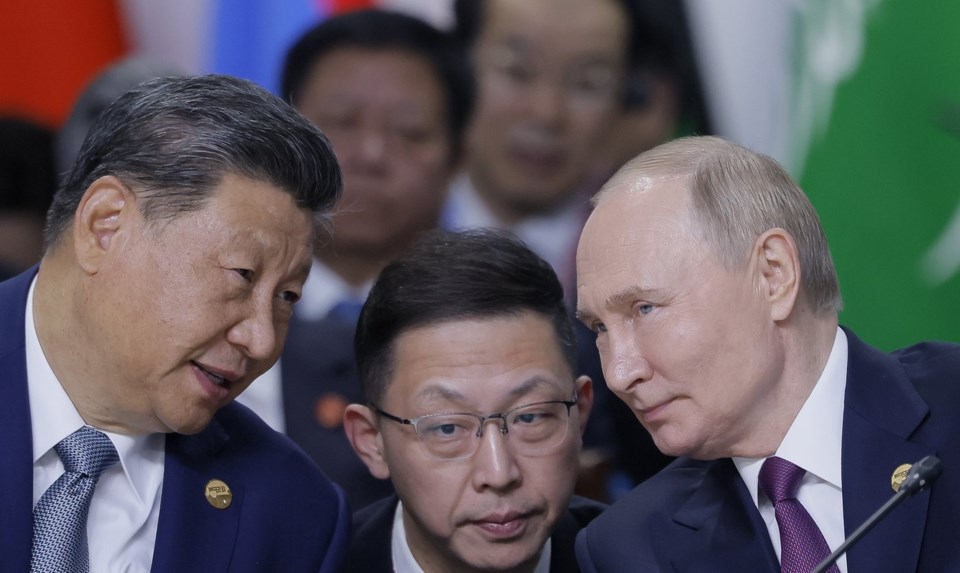KAZAN, Russia (AP) — Russian President Vladimir Putin closed a summit of the BRICS bloc of developing economies on Thursday, praising its role as a counterbalance to what he called the West's “perverse methods."
The three-day summit in the city of Kazan was attended by leaders or representatives of 36 countries, highlighting the failure of United States-led efforts to isolate Russia over its actions in Ukraine.
The conflict came up repeatedly at the meeting, which saw the first visit to Russia from United Nations Secretary-General Antonio Guterres in more than two years and drew an angry reaction from Kyiv. Guterres called for “a just peace” in Ukraine, in line with the U.N. Charter, international law and General Assembly resolutions. He also urged an immediate end to the fighting in Gaza, Lebanon and Sudan.
At a news conference Thursday night, Putin was asked about former U.S. President Donald Trump's promise to end the fighting in Ukraine.
“What Mr. Trump said recently, what I heard, (is) he spoke about the desire to do everything to end the conflict in Ukraine," Putin said. "It seems to me that he said it sincerely. We certainly welcome statements of this kind, no matter who makes them.”
Putin also was asked about whether any North Korean troops were in Russia, which he neither confirmed nor denied. The U.S. said Wednesday that 3,000 North Korean troops have been deployed to Russia and are training at several locations.
“Images are a serious thing, if there are images, then they reflect something," he said when asked about satellite photos of troops.
Putin noted that lawmakers in Moscow earlier in the day ratified a pact with North Korea on mutual military assistance as part of a “strategic partnership” with Pyongyang.
“We have never doubted that the North Korean leadership takes our agreements seriously. What and how we will do within the framework of this article (of the agreement) is our business,” he said.
The summit covered the deepening of financial cooperation, including the development of alternatives to Western-dominated payment systems, efforts to settle regional conflicts and expansion of the BRICS group of nations.
The alliance that initially included Brazil, Russia, India, China and South Africa when it was founded in 2009 has expanded to embrace Iran, Egypt, Ethiopia, the United Arab Emirates and Saudi Arabia. Turkey, Azerbaijan and Malaysia have formally applied to become members, and several other countries have expressed interest in joining.
The Kremlin touted the summit as “the largest foreign policy event ever held” by Russia.
Speaking at what was dubbed the “BRICS Plus” session, which included countries that are considering joining the bloc, Putin accused the West of trying to stem the growing power of the Global South with “illegal unilateral sanctions, blatant protectionism, manipulation of currency and stock markets, and relentless foreign influence ostensibly promoting democracy, human rights, and the climate change agenda.”
“Such perverse methods and approaches — to put it bluntly — lead to the emergence of new conflicts and the aggravation of old disagreements,” Putin said. “One example of this is Ukraine, which is being used to create critical threats to Russia’s security, while ignoring our vital interests, our just concerns, and the infringement of the rights of Russian-speaking people.”
Russia has specifically pushed for the creation of a new payment system that would offer an alternative to the global bank messaging network SWIFT and allow Moscow to dodge Western sanctions and trade with partners.
In a joint declaration Wednesday, participants voiced concern about “the disruptive effect of unlawful unilateral coercive measures, including illegal sanctions” and reiterated their commitment to enhancing financial cooperation within BRICS. They noted the benefits of “faster, low-cost, more efficient, transparent, safe and inclusive cross-border payment instruments built upon the principle of minimizing trade barriers and non-discriminatory access.”
China's President Xi Jinping has emphasized the bloc’s role in ensuring global security. Xi noted that China and Brazil have put forward a peace plan for Ukraine and sought to rally broader international support for it. Ukraine has rejected the proposal.
“We should promote the de-escalation of the situation as soon as possible and pave the way for a political settlement,” Xi said.
Putin and Xi had announced a “no-limits” partnership weeks before Russia sent troops into Ukraine in 2022. They already met twice earlier this year, in Beijing in May and at a Shanghai Cooperation Organization summit in Kazakhstan in July.
Russia’s cooperation with India also has flourished as New Delhi sees Moscow as a time-tested partner since the Cold War despite Russia’s close ties with India’s rival, China. While Western allies want New Delhi to be more active in persuading Moscow to end the fighting in Ukraine, Indian Prime Minister Narendra Modi has avoided condemning Russia while emphasizing a peaceful settlement.
Addressing the BRICS Plus session, Guterres urged an immediate end to the fighting in Gaza, Lebanon, Ukraine and Sudan. “We need peace in Ukraine, a just peace in line with the U.N. Charter, international law and General Assembly resolutions,” he said.
Russia's Kremlin-controlled media touted the summit as a massive policy coup that left the West fearing the loss of its global clout. State TV shows and news bulletins underscored that BRICS countries account for about half the world's population comprising the “global majority” and challenging Western “hegemony.”
TV hosts elaborately quoted Western media reports saying that the summit highlighted the failure to isolate Moscow. “The West, the U.S., Washington, Brussels, London ended up isolating themselves,” said Yevgeny Popov, host of a popular political talk show on state channel Rossiya 1.
The Associated Press



